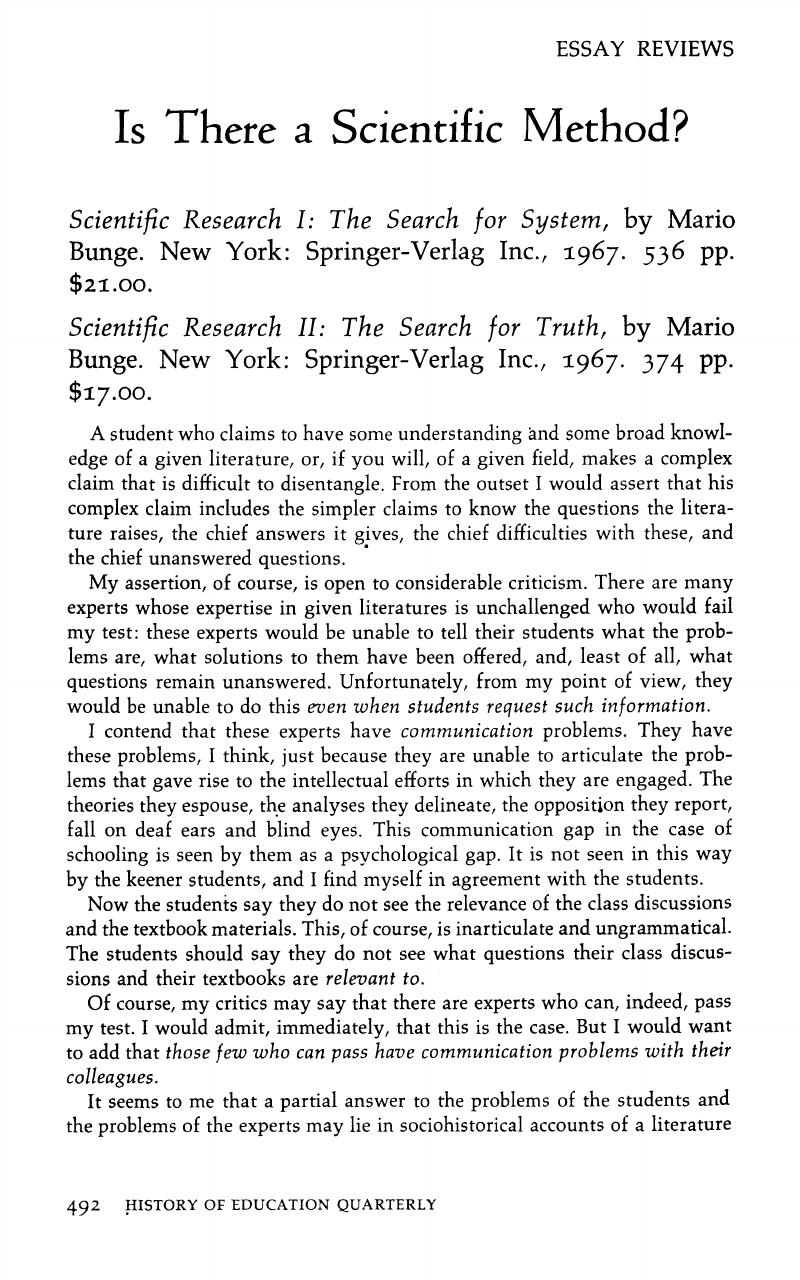No CrossRef data available.
Article contents
Is There a Scientific Method?
Published online by Cambridge University Press: 24 February 2017
Abstract

- Type
- Essay Reviews
- Information
- Copyright
- Copyright © 1969 History of Education Quarterly
References
Notes
1. Einstein, Albert, On the Method of Theoretical Physics (New York: Oxford University Press, 1933), p. 5.Google Scholar
2. An example of this former classroom procedure may be found in Hempel, Carl G., Philosophy of Natural Science (Englewood Cliffs, N.J.: Prentice-Hall, Inc., 1966), p. 3ff.Google Scholar
3. Popper, Karl R., Conjectures and Refutations (New York: Basic Books, 1963.)Google Scholar
Popper, Karl R., The Logic of Scientific Discovery, English ed. (New York: Basic Books, 1959.)Google Scholar
Kuhn, Thomas S., The Structure of Scientific Revolutions (Chicago: University of Chicago Press, 1962.)Google Scholar
Kuhn, Thomas S., The Copernican Revolution (New York: Random House, 1959.)Google Scholar
4. Interest in the sociology of science has flourished in the last ten years; see Hagstrom, Warren O., The Scientific Community (New York: Basic Books, 1964.); Klaw, Spencer, The New Brahmins (New York: William Morrow & Co., 1968.) Google Scholar
5. Reference is made to the works of P. K. Feyerabend, Joseph Agassi, J. J. C. Smart, Ian C. Jarvie, Mario Bunge, W. W. Bartley, among others.Google Scholar
6. Reference is made to the works of Carl G. Hempel, Ernest Nagel, May Brodbeck, Mary Hesse, Nelson Goodman, Isaac Levi, Henry Kyburg, Max Wartofsky, among others.Google Scholar
7. A major exception is Hanson, Norwood Russell, Patterns of Discovery (Cambridge: University Press, 1958.)Google Scholar
8. An example may be found in Kyburg, Henry Jr., Philosophy of Science (New York: The Macmillan Co., 1968) p. 5. “There also are those, like K. R. Popper, who take the logic of evidential support to be simply the logic of tests of hypotheses; but this is essentially just classical deductive logic….” Google Scholar
9. The argument centers on the problem of induction; for recent discussion see Lakatos, Imre, ed., The Problem of Inductive Logic (Amsterdam: North-Holland, 1968).CrossRefGoogle Scholar
10. Agassi, Joseph, “The Confusion Between Science and Technology in the Standard Philosophies of Science,” Technology and Culture, VII (Summer 1966), p. 348.CrossRefGoogle Scholar
14. Edgerton, Stephenie G., “Have We Really Talked Enough About Authority?” Studies in Philosophy and Education, VI (Spring, 1969), p. 369. Bartley, William W., Retreat to Commitment (New York: Alfred Knopf, 1962.) CrossRefGoogle Scholar
11. Bunge, Mario, Scientific Research I (New York: Springer-Verlag, Inc. 1967.)CrossRefGoogle Scholar
12. Ibid., p. 171.Google Scholar




